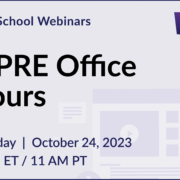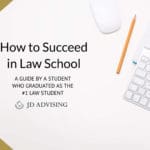What Is Actually Tested On The MPRE?
What Is Actually Tested On The MPRE?
Some students are surprised to hear that the Model Professional Responsibility Exam (MPRE) tests more than just the Rules of Professional Conduct. In this post, we highlight the material that is tested on the MPRE!
What Is Actually Tested On The MPRE?
ABA Model Rules of Professional Conduct
The most obvious source of the material tested on the MPRE is the ABA Model Rules of Professional Conduct (MRPC). The text of the rules can be found on the ABA’s website.
The first thing to note about the MRPC is that you do not need to know the rule numbers for the MPRE. It is only necessary to learn the black letter law.
Second, you do not have to review the actual rules if you have a quality substantive MPRE outline. A good outline will provide the rules that you need to know in a more straightforward manner than the rules are presented in their “raw form.” JD Advising offers a great free outline as part of its free MPRE course!
Third, there is very important information in many of the comments to the rules. However, a good outline will identify the necessary information from the comments that you must know. This will save you time so you don’t have to review every single comment for relevant information.
Finally, not all rules are tested equally. Rules covering the conflicts of interest and the duty of confidentiality are tested far more often than rules such as those covering transactions with persons other than clients.
Also, note that the MPRE tests the model rules. There are no jurisdiction-specific rules tested on the MPRE. So, if you took a Professional Responsibility class in law school and your professor covered rules that are specific to your jurisdiction, be sure to review (and memorize) the Model Rules of Professional Conduct for the MPRE. There are often differences between the Model rules and various jurisdictions’ rules that are important to know!
Judicial Code of Conduct
In addition to the rules governing the conduct of lawyers, the MPRE also tests the ABA’s Model Code of Judicial Conduct (MCJC), which can also be found on the ABA’s website.
The NCBE has indicated that approximately 2-8% of the questions on the MPRE will cover the MCJC. That equates to about 1-4 questions. Most students report seeing approximately 2 questions testing the Code of Judicial Conduct on the MPRE. There are A LOT of rules to learn in the Code of Judicial Conduct. You could spend a lot of time reviewing the MCJC for 2 questions. This is not an efficient use of your study time. So, we recommend briefly reviewing the entire MCJC, and then carefully reviewing the rules from the Code of Judicial Conduct. Specifically, focus on those that are highly tested, such as the rules regarding the disqualification of a judge and extrajudicial activities. Also, reviewing practice questions that test the MCJC will provide some insight as to how the MCJC is tested on the exam.
Substantive Law
In addition to the MRPC and the MCJC, the MPRE tests your knowledge of substantive law that you probably learned during your first year of law school.
For instance, the MPRE tests a lawyer’s civil liability in various contexts. This often requires an examination of whether professional malpractice has occurred. Professional malpractice is really just negligence, which you probably learned in your 1L Torts class. It is important that you understand not only the elements of negligence, but also that you can spot an intentional tort, such as fraud, misrepresentation, or malicious prosecution. A lawyer could be civilly liable for any of the above.
The MPRE also tests Evidence, including the Attorney-Client Privilege. While the similar Duty of Confidentiality can be found in the ABA MRPC, the Attorney-Client Privilege is an evidentiary rule that you are expected to know for the MPRE.
Nonetheless, you do not need to pull out your 1L outlines to prepare for the MPRE. One way to prepare for the MPRE is to take the Professional Responsibility course at your school. You will, undoubtedly, cover these key concepts as part of that course. Additionally, quality MPRE preparation materials will cover what you need to know about negligence and the attorney-client privilege (among other things). Finally, completing practice questions (and we recommend that you use real MPRE practice questions) will help expose you to exactly how these concepts are tested on the MPRE so that you are well-prepared to tackle any questions you might see.
Looking to Ace the MPRE?
- Enroll in our 5-star rated free MPRE Course, complete with expert guidance, an exclusive outline, practice questions, and a one-sheet.
- Tackle the Real MPRE questions — the gold standard for test preparation.
- Elevate your preparation with personalized MPRE private tutoring, featuring a tailored study plan and dedicated MPRE outline.
- Dive into our assortment of complimentary top-notch MPRE resources for your success.








Leave a Reply
Want to join the discussion?Feel free to contribute!